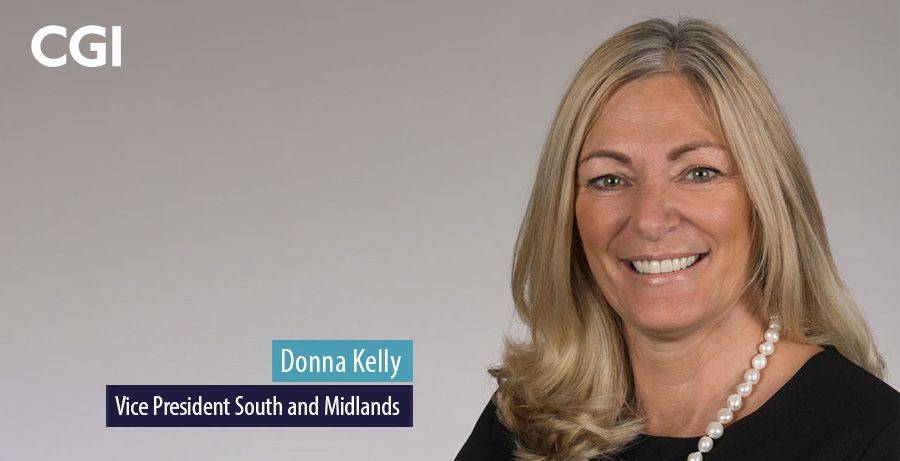
CGI Leader Donna Kelly on Gender Diversity in the Tech Industry
Business
Donna Kelly is the leader of CGI’s South and Midlands business unit in the UK. A passionate diversity leader, we sat down with her to discuss the tech industry's attitudes towards gender diversity and how CGI is providing its employees from all backgrounds with a diverse and inclusive workplace.
Can you tell us more about your experiences as a business leader within the tech industry and your leadership journey?
I joined CGI back in January 2013, and today I am a Senior Vice President for several key services across the UK. Prior to joining CGI, I had worked in the technology industry for over 25 years with roles across businesses such as Capgemini and IBM.
Before my career in technology, I was a registered Accident and Emergency nurse. My role as a nurse made me a keen people person honing my people management and leadership skills, which have been invaluable as a leader in tech.
It might be a surprising transition, but the change in my career journey came once I had my son. Working in Accident and Emergency meant a tough timetable to keep up with and arrange childcare for. As a natural transition, I began working as a factory nurse. The speed was a lot slower, so I found myself with more time and began to speak with the company’s IT department, which was next door.
The relationships I built in this role helped me rediscover my passion for technology and eventually, I began working in the IT department. My nursing skills meant not only did I have a technical brain, but I was also a great communicator and had people skills that helped complete projects and connect teams.
What bias, if any, have you experienced in business, and how can we begin to counter this?
Based on my experiences, I feel that the technology industry’s approach to gender equality has evolved, but it still has a long way to go before it can be considered completely inclusive. I have sat in rooms where I was expected to take notes rather than contribute, and it pushed my female colleagues and I to work twice as hard to prove we belonged there on our merits.
Bias in business can be both conscious and unconscious, but the impact and implications remain the same. It is also not limited to gender, and this is a struggle all marginalised groups, including the BAME community and those who are neurodiverse or differently abled.
In my experience, the most important approach to tackling bias is communication, education and training. Acknowledging where bias exists and providing support and tools to help combat this for all employees.
You have said that you believe education is a far more valuable tool than sensationalism when approaching any situation of bias in the workplace – can you expand on this?
The goal for all businesses should be to create a welcome and inclusive environment, in which all members feel able to be their whole selves at work. In my experience a combination of celebration and education are needed to create this environment.
Further reading: Implementing reverse mentoring to become an inclusive leader.
The role of education is something we look to achieve with our diversity and inclusion networks at CGI. We are always looking for ways to empower our employees, encouraging them to use their voices to enact change, creating a culture that encourages these discussions.
We all have internal biases that we are so often unaware of, and often these conversations can help others understand them better. I think it’s far better to teach alternatives than attack someone for something they have done or said unconsciously. Let us support an environment where we can all learn from our mistakes.
As a leader in the technology industry, how are you supporting women in the workplace at CGI?
As a tech leader, I have been approached about dealing with a few uncomfortable situations in my time. At these times, I have tried to act as an advisor and confidant to anyone navigating this issue.
At CGI, we have numerous networks where colleagues can collaborate and have open and transparent conversations with one another; spaces where they can share tips on vital working practices, all of which is shared with the rest of the business. From BAME to Menopause networks, our Diversity & Inclusion groups are led by people with relevant life experiences as they are our best teachers.
In today’s world, organisations should consider programmes like this a business obligation rather than a nice-to-have. Ultimately, if an organisation wants to call itself inclusive, if it wants to break those biases, you must empower your employees with the correct tools and freedom to make change a reality.
You mention that diversity and inclusion need to be considered business obligations, how do you propose businesses support this and how are you managing this at CGI?
There are many steps businesses can take to champion women in the workplace, all of which we have adopted at CGI and are proving useful across the business. This includes reporting your gender pay gap – publicly sharing information about where your organisation is at is a powerful way to focus minds and prompt action.
However, gender pay gap reporting – though important – is now very much the bear minimum. At CGI we make it a point of principle to ensure our members feel like their careers can and will progress, regardless of their gender, background, or circumstance.
For instance, we offer those on maternity and parental leave remote training courses and coaching before, during and after leave. This helps us to create a culture of learning which enables our skilled professionals to progress. If more organisations looked to encourage upskilling for all talent, our industry would cement its position as an attractive sector to a diverse range of people and groups.
It’s also vital we inspire the next generation of tech leaders and at CGI we have implemented bring your daughter to work days in the past to help promote the tech sector as a friendly and viable option for girls. We hope to inspire them and hope that one day they too will pick up the mantle and lead our field.
What are the repercussions of a lack of diversity in the tech sector?
The impact of not having different backgrounds represented in the tech industry will have lasting impacts on our society. The negative effects of technology bias already are being seen, particularly around things like AI and race and the role gender plays in physical technology.
Businesses need to have a diverse and inclusive workforce to understand their customers better. Without diversity, innovation in technology will not account for all of society and will dampen wider progression.
How can other business leaders support women at work and into more senior positions?
I think the first and most crucial step is ensuring women have a space to speak openly and honestly at your organisation. At CGI, we are supporting female colleagues by providing them with mentors. From my own experiences and conversations with other women, we’ve found it’s great for women to have role models who demonstrate that achieving their ambitions is possible.
If young women see someone who has overcome challenges and even prejudice to achieve a leadership role, they realise they also may be capable of achieving more than they thought.
Additionally, let the women who work for you within senior positions speak openly about the challenges they face or have faced as a woman in the working world. And engage in an open conversation about this. From my experience, engaging in these conversations with all female employees is a much-needed breath of fresh air for many.

